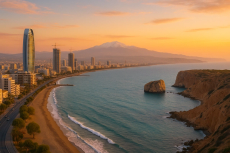Blog • Published on:March 27, 2025 | Updated on:March 27, 2025 • 30 Min
A Complete Guide to Digital Nomad Visa Programs Around the World
Did you know there are now over 66 digital nomad visas around the world? Countries from Panama and Costa Rica to the UAE and Spain are all competing to welcome remote workers and entrepreneurs like you.
With tax benefits, great quality of life, and growing communities of global professionals, becoming a digital nomad is easier, and more appealing, than ever before.
Europe, in particular, has emerged as the favorite place for digital nomads, with Spain, Malta, and Portugal leading the charge. Meanwhile, on the other side of the globe, Asian countries have taken notice of Europe's success.
Thailand, Indonesia, and Malaysia, among others, are actively exploring or launching their own remote worker programs to draw global talent and bolster their local economies.
In this guide, we will give you a complete look at digital nomad visa programs worldwide, from requirements and processes to lifestyle insights and tax considerations. So, let's begin.
What is a Digital Nomad Visa?
Let's understand the concept of this specific residency permit. So, a digital nomad visa is a special type of residency visa for remote workers, such as freelancers, self-employed individuals, entrepreneurs, and remote employees, that allows them to live legally in another country while continuing their work remotely.
To qualify, your income must come from sources outside the country you plan to reside in. For instance, if your employer or business is based in Germany, you can apply for a digital nomad visa anywhere except Germany itself.
Income requirements vary from country to country. Malta, for instance, expects digital nomads to earn a minimum monthly income of €3,500, whereas Portugal requires €3,480.
Typically, digital nomad visas are valid for one year, with the possibility of renewal, giving remote workers flexibility and stability.
Why Are Countries Introducing Digital Nomad Visas?
The surge in digital nomad visas began largely during and after the COVID-19 pandemic, driven by several significant shifts.
Firstly, remote work became widespread as companies realized employees could be just as productive from home or any global location, significantly reducing overhead costs like office space.
Meanwhile, workers seized this newfound flexibility to explore living abroad, pursuing destinations offering a more appealing lifestyle, better climate, or improved quality of life. However, traditional tourist visas were inadequate for extended stays, prompting the need for a new type of visa to support remote working lifestyles legally over longer periods.
Additionally, countries impacted by declining tourism revenue due to border closures and travel restrictions turned to digital nomads as a valuable source of economic stimulation.
By attracting high-earning remote workers, nations could boost local spending, support service industries, and revitalize their economies.
Lastly, many nations have faced a "brain drain," where skilled professionals leave their home countries for better opportunities elsewhere.
Digital nomad visas present an appealing solution to this challenge, attracting international talent to fill skill gaps, stimulate innovation, and strengthen the local economy without directly competing with local employment.
Countries Offering Digital Nomad Visas
Popular Digital Nomad Visa Destinations
Spain Digital Nomad Visa: Europe’s Favorite for Remote Professionals
Spain currently ranks as the world's best destination for digital nomads, according to the 2025 Digital Nomad Visa Index. Its popularity raised even more following the cancellation of the Spanish Golden Visa. Now, the Digital Nomad Visa attracts remote workers who earn their income from companies based abroad.
Applicants initially receive a 1-year Digital Nomad Visa, after which they can switch to a 3-year residence permit. After five continuous years, they become eligible for permanent residency.
Staying over 183 days per year brings additional benefit, a simplified flat-rate personal income tax of 24%, up to €600,000 annually.
Key details:
- Income requirement: €2,646/month (+ €993 spouse, €331 per child)
- Application processing: Around 4 months
- Initial validity: 1 year (Digital Nomad Visa), extendable with residence permit for an additional 3 years
- Family inclusion: Allowed
- Average monthly rent (one-bedroom): €812
- Cost of living index: 48.4
Portugal Digital Nomad Visa: Flexible Residency and Vibrant Communities
Portugal offers two distinct visas for remote workers: short-stay and long-stay. Both options are open to citizens outside the EU and EEA, differing mainly by duration:
- Short-Stay Visa: Valid up to one year; no extension or residency rights.
- Long-Stay Visa: Grants residence for two years, renewable for three more years. After five continuous years, holders may apply for permanent residency or citizenship.
Though previously Portugal offered significant tax incentives through its Non-Habitual Resident (NHR) program, these extensive tax benefits are limited to specific categories of residents.
Key details:
- Income requirement: €3,480/month
- Savings proof: €10,440 (single applicant) plus €5,220 for spouse, €2,610 per child
- Processing time: Around 6 months
- Family inclusion: Allowed
- Average monthly rent (one-bedroom): €818
- Cost of living index: 46.6
Malta Digital Nomad Visa: Island Lifestyle with Business Advantages
Malta’s Digital Nomad Permit targets foreign remote workers and entrepreneurs. Applicants must either have employment abroad, work freelance with international clients or manage foreign businesses.
The visa initially lasts for 1 year, renewable annually up to 3 years total. However, it doesn't provide a direct route to permanent residency or citizenship.
Key details:
- Income requirement: €3,500/month
- Processing time: Approximately 2 months
- Family inclusion: Allowed
- Average monthly rent (one-bedroom): €832
- Cost of living index: 55.1
Hungary’s White Card: Central European Simplicity
Hungary's digital nomad program, the White Card, welcomes freelancers and entrepreneurs for a maximum of two years, initially one year, with the possibility to extend for another.
The program strictly accepts individual applications and does not allow family members to join.
Key details:
- Income requirement: €3,000/month
- Processing time: About 6 months
- Family inclusion: Not permitted
- Average monthly rent (one-bedroom): €382
- Cost of living index: 43.4
St Lucia Digital Nomad Visa: Tropical Lifestyle, Easy Residency
St Lucia offers flexible digital nomad residency without strict financial minimums. Applicants must simply demonstrate adequate funds to comfortably cover living expenses. Additionally, nomads spending over 183 days annually can enjoy zero income tax on foreign-earned income.
Key details:
- Minimum income: None (must prove sufficient living funds)
- Processing time: Approximately 1 week
- Family inclusion: Allowed
- Average monthly rent (one-bedroom): $416
- Cost of living: Single: ~$1,019/month, Family: ~$2,596/month
Panama: The Pathway to the Americas
Panama isn’t new to expats, but it's rapidly becoming a top choice for digital nomads. With its territorial tax system (meaning foreign-earned income isn't taxed), Panama makes financial sense.
All you need to show is a stable monthly income of at least $3,000. Your initial residency lasts nine months, renewable for an additional nine months, perfect if you're seeking flexibility without long-term commitment. Panama’s excellent flight connectivity makes it an ideal base if travel accessibility is high on your list.
Key Details
- Minimum income: $3,000/month
- Visa duration: 9 months (+9 months renewal)
- Tax benefit: Territorial tax (zero tax on foreign income)
- Connectivity: Major air hub for international trave
Costa Rica: Happiness Meets Productivity
Consistently ranked as one of the happiest countries globally, Costa Rica is a dream for remote workers seeking balance. Prove you earn at least $3,000 monthly (or $4,000 if bringing family), and Costa Rica welcomes you with a renewable one-year visa.
Plus, with its territorial tax policy, you'll avoid paying taxes on income earned overseas, making this tropical paradise financially appealing as well.
Key Details
- Minimum income: $3,000 single, $4,000 family
- Visa duration: 1 year (+1 year renewal)
- Tax benefit: Territorial taxation (no foreign income tax)
- Lifestyle: Exceptional quality of life, nature-focused culture
Dominica’s WIN Visa: Caribbean Remote Working Solution
Dominica offers the Work in Nature (WIN) visa, allowing foreign remote workers up to 18 months residency.
Online application procedures simplify the process significantly. The WIN visa exempts holders from local taxation.
Key details:
- Income requirement: $50,000 annually
- Processing time: Around 1 month
- Family inclusion: Allowed
- Average monthly rent (one-bedroom): $320
UAE: Work Remotely from Dubai's Dynamic Hub
The UAE, particularly Dubai, offers an often overlooked but very appealing virtual working visa. It's ideal if you love the excitement and luxurious lifestyle of the Middle East.
With proof of an annual income of $42,000, you’ll gain a one-year residency allowing you to experience life in Dubai, tax-free on foreign income, with no capital gains or personal income taxes.
Key Details:
- Income Requirement: $42,000 annually
- Visa Duration: 1 year (non-renewable, reapplication possible)
- Tax Benefits: Zero personal income tax on foreign income
Antigua and Barbuda Digital Nomad Visa: Two-Year Caribbean Option
Antigua and Barbuda provide remote workers with a straightforward 2-year visa, non-renewable but ample enough for many nomads.
The main applicant must prove annual earnings of at least $50,000 and can include family members and domestic help on their application.
Key details:
- Income requirement: $50,000 per year
- Processing time: Approximately 2 weeks
- Family inclusion: Allowed
- Average monthly rent (one-bedroom): $555
Ecuador Digital Nomad Visa: Affordable South American Residency
Ecuador’s Rentista for Remote Work visa grants digital nomads two-year residency periods, renewable indefinitely.
Minimal financial requirements and straightforward extensions make it an appealing Latin American choice.
Key details:
- Income requirement: $1,350/month
- Processing time: Around 2 weeks
- Family inclusion: Allowed
- Average monthly rent (one-bedroom): $311
- Cost of living index: 33.6
Brazil Digital Nomad Visa: Budget-Friendly with Active Communities
Brazil targets budget-conscious nomads with one-year visas, renewable indefinitely, at a low monthly income requirement of $1,500.
Popular nomad-friendly cities like Florianopolis have thriving remote-worker communities.
Key details:
- Income requirement: $1,500/month or savings of $18,000
- Processing time: Approximately 2 weeks
- Family inclusion: Allowed
- Average monthly rent (one-bedroom): $291
- Cost of living index: 35.2
Turkey Digital Nomad Visa: Bridging Europe and Asia
Turkey’s remote-work visa aims at individuals aged between 21 and 55 holding higher education diplomas. The minimum income requirement is $3,000 per month.
However, the program currently does not permit generating income within Turkey or working with local companies.
Key details:
- Income requirement: $3,000/month
- Visa duration: Yet to be finalized
- Family inclusion: Not clarified yet
- Average monthly rent (one-bedroom): $498
- Cost of living index: 33.8
Benefits of Digital Nomad Visa Programs
- Extended Legal Residency: Digital nomad visas allow you to legally stay and work abroad for a longer period than standard tourist visas, often one year or more, providing greater stability and comfort.
- Freedom and Flexibility: These visas empower you to travel and work from wherever you prefer, giving you complete control over your work-life balance. Enjoy a change of scenery anytime, from bustling cities to tranquil coastal towns.
- Global Networking Opportunities: Living as a digital nomad connects you with diverse communities of entrepreneurs, remote workers, and freelancers from around the world, offering rich networking opportunities that can enhance your career and personal growth.
- Reduced Bureaucratic Complexity: Obtaining a digital nomad visa typically involves fewer bureaucratic procedures compared to traditional residency or work permits, often with straightforward online applications and quicker processing times.
- Access to High-Quality Infrastructure: Many digital nomad-friendly countries offer reliable internet services, modern co-working spaces, excellent transportation systems, and vibrant cultural environments, making it easy to maintain productivity abroad.
- Favorable Financial and Tax Benefits: Certain destinations provide attractive tax benefits specifically tailored for digital nomads, such as favorable tax residency schemes or exemptions, allowing you to maximize your income while working abroad.
How Digital Nomad Visas Differ from Other Residency Programs
Purpose and Eligibility
- Digital Nomad Visa: Specifically crafted for remote professionals, freelancers, and entrepreneurs who earn income from foreign sources, enabling them to live abroad without local employment.
- Golden Visa (Investor Residency): Designed primarily for investors making significant financial contributions, such as purchasing real estate or investing in local businesses.
- Traditional Work Permit: Requires employment from a local company and sponsorship, typically involving extensive paperwork and official approvals.
Income and Investment Requirements
- Digital Nomad Visa: Applicants must demonstrate stable foreign-generated monthly income, typically moderate and achievable, e.g., around €2,646–€3,500.
- Golden Visa: Involves substantial financial commitments, often requiring investments of hundreds of thousands to millions of euros.
- Traditional Work Permit: Income dictated by local employment contracts, with no independent income requirement.
Duration and Flexibility
- Digital Nomad Visa: Offers considerable flexibility, usually valid for one year with renewal possibilities based on continued remote work status.
- Golden Visa: Often provides multi-year or long-term residency, conditional on maintaining the initial investment.
- Traditional Work Permit: Validity depends on the length of employment contracts and can vary from several months to a few years, subject to renewal based on continued employment.
Application Process and Complexity
- Digital Nomad Visa: Streamlined, digital-friendly process involving fewer bureaucratic hurdles and simpler documentation.
- Golden Visa: Complex, involving detailed investment documentation, due diligence, and lengthier processing times.
- Traditional Work Permit: Requires local employer sponsorship, labor market tests, and significant administrative effort.
Local Employment and Business Activity
- Digital Nomad Visa: Prohibits local employment or local business establishment; work must be foreign based.
- Golden Visa: Allows local business activities and investments, with potential employment opportunities.
- Traditional Work Permit: Tied exclusively to local employment, restricting changes to jobs without official permission.
Residency Path and Citizenship Opportunities
- Digital Nomad Visa: Usually doesn’t lead directly to permanent residency or citizenship, though it might support initial steps toward other immigration routes.
- Golden Visa: Typically provides a clear, structured pathway to permanent residency or citizenship after maintaining investments for a specified period.
- Traditional Work Permit: Can lead to permanent residency over time through continuous employment and local integration.
Additional Documents Needed for Digital Nomad Visas
When applying for a Digital Nomad Visa, countries usually ask for specific documents beyond proof of income. Ensuring you have these prepared in advance makes the application process smoother and quicker:
Valid Passport and Identification
- A passport valid for the entire duration of your planned stay, often required to have additional blank pages.
- Government-issued IDs or national identity cards may also be requested.
Proof of Remote Employment or Freelance Activity
- Official employment contract or client agreements clearly showing your remote working status.
- Self-employed applicants should present business registration documents or professional certificates.
Accommodation Confirmation
- Evidence of accommodation such as rental agreements, hotel reservations, Airbnb bookings, or a signed letter from a local host confirming your residential address.
Comprehensive Health Insurance Coverage
- Proof of full medical insurance coverage valid throughout your stay, meeting the minimum coverage levels set by each country (often including hospitalization, emergency treatment, and repatriation).
Clean Criminal Record Certificate
- A recent criminal background check or police clearance issued by your country of origin, usually no older than six months.
- Additional security clearances may occasionally be required by specific countries.
Proof of Family Relationship (if applicable)
- Marriage certificates, birth certificates, or other legal documents proving family relationships, if your spouse or children will accompany you.
Educational and Professional Qualifications
- Diplomas, academic transcripts, or professional certifications may be requested in some jurisdictions, especially for positions requiring specific qualifications.
Medical Certificate
- A basic health certificate issued by a certified physician, confirming you're free from contagious diseases (required by certain countries).
Ensuring these documents are accurate, up-to-date, and translated into the language of the host country (when necessary) helps prevent delays in visa processing and approval.
Application Process for Digital Nomad Visas
Online vs. In-Person Application Options
Online Applications:
Countries such as Spain, Malta, Portugal, and many others now provide completely online application processes.
This significantly simplifies and accelerates the procedure, allowing applicants to submit all required documentation electronically and track their application status remotely.
In-Person Applications:
Although less common, some destinations may require applicants to visit their nearest embassy or consulate to verify identity or submit specific documents.
This step is typically straightforward, with clear instructions provided during the application.
Visa Processing Times: What to Expect
- Spain: Typically between 1 to 4 months. Spain offers one of the quicker digital nomad visa processes, often completing reviews swiftly for straightforward applications.
- Malta: Usually takes around 2 months or slightly longer. Malta’s application timeline is predictable, with clearly defined steps.
- Portugal: Approximately 4 to 6 months. Portugal requires slightly longer processing periods due to higher application volumes and detailed assessments.
Applicants should allow extra time, especially during peak periods or holiday seasons, to accommodate potential delays.
Fees and Associated Costs
- Application fees for digital nomad visas generally vary between EUR 75 and EUR 200. Specific costs depend on the host country, the complexity of the individual application, and whether expedited services or additional documents are required.
- Fees are typically paid online using debit or credit cards and are non-refundable, regardless of the application outcome.
Renewal and Extension Procedures
- Digital nomad visas are typically renewable, provided applicants maintain their eligibility criteria. Renewals usually require updated proof of ongoing remote employment, comprehensive health insurance, and verification of compliance with local regulations.
- Renewal applications must often be submitted at least 30-60 days before the current visa’s expiration date to avoid gaps in legal residency.
- Some countries might require a brief reassessment or interview during renewal to verify continued eligibility.
Beyond Taxes: Picking Your Nomad Destination for Lifestyle
While tax savings are essential, digital nomads often choose destinations based on lifestyle factors, including social scenes, business opportunities, or political stability.
Spain remains popular, but feedback from digital nomads reveals mixed experiences, especially in Barcelona, where some expats don't feel particularly welcome.
Yet Spain still offers great benefits, like its straightforward path to nationality after ten years (or just two years for those with South American heritage), something unavailable in places like Dubai.
Meanwhile, Portugal is consistently popular, particularly due to its thriving tech and innovation communities centered around events like Lisbon’s Web Summit.
If you're planning to scale your business or build meaningful professional relationships, Portugal is the place to be.
Living as a Digital Nomad: In-Depth Insights on Spain, Malta, and Portugal
Choosing the right country significantly shapes your digital nomad experience. Let’s dive deeply into three leading European digital nomad destinations: Spain, Malta, and Portugal.
Cost of Living Comparison
Spain
Spain remains attractive for digital nomads, blending a comfortable lifestyle with reasonable costs.
- Accommodation: A centrally-located one-bedroom apartment in Barcelona or Madrid averages about €800–€1,100 monthly. Smaller cities like Valencia or Seville offer more affordable options, ranging between €600–€800.
- Groceries & Dining: Monthly grocery expenses for one person typically cost around €250–€300. Eating out is relatively inexpensive—enjoying tapas or a casual meal costs approximately €10–€15 per meal.
- Transportation: Spain has excellent public transportation. Monthly metro passes are around €50–€60 in major cities. High-speed trains efficiently connect most regions for around €30–€100 per trip, depending on distance.
Malta
Malta, slightly pricier but providing a premium lifestyle, is highly appealing for digital nomads seeking an English-speaking Mediterranean Island.
- Accommodation: In prime locations like Valletta or Sliema, a one-bedroom apartment costs around €850–€1,200 monthly. More affordable areas, like St. Paul's Bay, offer apartments for €650–€850.
- Groceries & Dining: Groceries average around €300–€350 monthly. Dining out at casual restaurants typically ranges from €12–€20 per meal, with fine dining options widely available but pricier.
- Transportation: Public transport is affordable, with monthly unlimited bus passes costing approximately €26. Car rentals or scooter options are popular among nomads at competitive weekly rates (€80–€150).
Portugal
Portugal remains an ideal budget-friendly destination, especially beloved by digital nomads in Lisbon, Porto, and the Algarve.
- Accommodation: Lisbon rents average €800–€1,000 monthly for a central one-bedroom. In Porto or smaller towns, rents fall to €600–€750.
- Groceries & Dining: Monthly groceries typically cost €200–€250. Portugal offers excellent value dining options, with casual meals averaging €8–€12, especially in Porto and Coimbra.
- Transportation: Monthly metro passes in Lisbon cost about €40, while Porto offers monthly transit for approximately €35. Long-distance buses and trains connecting major cities are also affordable (€10–€30 per trip).
Co-working Spaces and Facilities
Spain
Spain excels in offering vibrant co-working environments, particularly in major cities:
- Barcelona: Renowned for modern co-working spaces like OneCoWork and Betahaus, hosting regular networking events tailored for digital professionals.
- Madrid: Co-working places such as Loom and Impact Hub Madrid offer creative spaces, workshops, and strong communities, ideal for entrepreneurs and freelancers.
- Valencia: Affordable yet dynamic co-working communities like Wayco and Botánico Coworking attract nomads looking for a quieter atmosphere with strong connectivity.
Malta
Malta has seen significant growth in remote-friendly facilities:
- Valletta: Grand Central and SOHO Office Space offer comfortable workspaces with high-speed internet, business support services, and vibrant community events.
- Sliema & St Julian’s: These areas provide co-working options tailored to digital entrepreneurs, like Glashaus and CocoHub, often hosting meetups to foster networking and collaboration.
Portugal
Portugal’s well-developed co-working spaces cater explicitly to the nomad community:
- Lisbon: Time to Cowork and Second Home Lisbon are top choices, offering stylish offices, reliable internet, and engaging community-building events.
- Porto: Popular spaces include Porto i/o and Selina Navis, combining co-working with social and wellness activities, catering to both productivity and lifestyle balance.
Banking and Financial Considerations
Managing finances as a digital nomad is simplified through modern fintech solutions:
- Wise & Revolut: These widely-used platforms offer competitive exchange rates, multi-currency accounts, and low transfer fees, perfect for remote workers frequently traveling or working across borders.
- Local Banking: While most nomads rely heavily on digital banks, opening a local bank account in Spain, Malta, or Portugal can be beneficial, especially if planning a long-term stay. Banks such as CaixaBank (Spain), Bank of Valletta (Malta), and Millennium BCP (Portugal) provide straightforward account-opening processes for residents.
Internet Infrastructure
A reliable internet connection is crucial for remote professionals, and these three destinations excel:
- Spain: High-speed fiber-optic internet (up to 1 Gbps) is widely available, especially in urban areas. Barcelona, Madrid, and Valencia offer excellent connectivity options, even in cafes and public spaces.
- Malta: Despite its small size, Malta provides reliable internet speeds averaging around 100–250 Mbps, suitable for video conferencing and large file transfers. Connectivity is strong island-wide, particularly in Valletta and St Julian’s.
- Portugal: Portugal has robust internet infrastructure, especially in Lisbon, Porto, and the Algarve region. Speeds consistently range between 200–500 Mbps, and most apartments, cafes, and co-working spaces have stable Wi-Fi, ideal for seamless remote working.
Tax Implications for Digital Nomads: Overview of Spain, Malta, and Portugal
Managing tax obligations wisely is crucial for digital nomads. Each country has distinct rules around tax residency, double taxation, and available incentives. Let's explore these in-depth for Spain, Malta, and Portugal:
Tax Residency Rules
Becoming a tax resident typically depends on the length of your stay within a country, usually defined as 183 days or more in a given tax year. Here's how it works specifically for our top three destinations:
- Spain: Spending more than 183 days per year in Spain makes you a tax resident. Additionally, if your primary professional activities, financial interests, or immediate family reside in Spain, you might also qualify as a tax resident regardless of the exact days spent. Tax residency triggers obligations for worldwide income reporting.
- Malta: Similar to Spain, residing in Malta for 183 days or more per year classifies you as a tax resident. Malta also considers the principle of "ordinary residence," meaning if your habitual home and lifestyle revolve around Malta, tax residency rules apply, even if you travel frequently.
- Portugal: Portugal’s rules follow the standard 183-day criterion, but also include owning or renting property with intentions of long-term residency, which can establish tax residency earlier. Once deemed a resident, you must declare worldwide income to Portuguese tax authorities.
Double Taxation Agreements (DTAs)
Double taxation agreements are treaties between countries that prevent income from being taxed twice, once in your home country and once in your country of residence. Spain, Malta, and Portugal all have extensive treaty networks:
- Spain: Spain has signed DTAs with over 90 countries, including the US, UK, Germany, Canada, and most Asian and Latin American countries. These treaties help digital nomads minimize tax burdens by clarifying income sources, credits, and exemptions.
- Malta: Malta maintains DTAs with around 75 countries worldwide. Agreements with major economies like the UK, the US, Germany, and France help remote workers living in Malta optimize their global tax strategies, ensuring income isn’t double-taxed.
- Portugal: Portugal’s extensive network covers over 80 nations, prominently including the US, UK, Brazil, and many EU states. This comprehensive coverage allows nomads living in Portugal substantial flexibility in managing cross-border income and investments effectively.
Tax Benefits and Incentives by Country
Each of these countries offers specific tax incentives attractive to digital nomads, although conditions and rules vary significantly:
Spain – Special Tax Regime ("Beckham Law")
- Digital nomads and remote professionals living in Spain can benefit from a special tax regime known informally as the "Beckham Law."
- It allows qualifying residents to pay a flat income tax rate of 24% on income up to €600,000 per year (47% on amounts exceeding that threshold).
- This favorable regime lasts for up to 6 years and applies exclusively to foreign-sourced income and professional earnings.
Malta – Remittance-Based Taxation
- Malta operates a remittance-based taxation system advantageous to digital nomads.
- Foreign-sourced income is taxed only if brought into Malta, while income generated locally or remitted to Malta is taxed progressively up to 35%.
- Capital gains earned outside Malta are generally not taxable, making this appealing for digital nomads earning foreign income and retaining it abroad.
Portugal – Non-Habitual Resident (NHR) Scheme
- Historically, Portugal's Non-Habitual Resident (NHR) scheme has been highly beneficial. Until late 2023, it allowed qualifying residents to benefit from tax exemptions or reduced rates on foreign income for up to 10 years.
- Currently, the NHR regime still exists but has become more selective, now primarily targeting professionals in specific fields such as technology, science, arts, or higher value-added occupations.
- Income from qualifying activities can be taxed at a special flat rate of 20%, significantly lower than Portugal’s regular income tax rates (up to 48%).
Digital Nomad Visas vs Other Immigration Options
When considering long-term relocation, digital nomads often explore multiple immigration pathways.
Understanding how digital nomad visas differ from other popular programs, such as Golden Visas and traditional work permits, is essential to make the best choice. Here's an in-depth breakdown:
Digital Nomad Visas vs. Golden Visas
Purpose and Target Audience:
- Digital Nomad Visas:
- Specifically tailored for remote workers, freelancers, and online entrepreneurs.
- Designed to attract skilled professionals generating foreign-sourced income.
- Generally require moderate monthly income proof (e.g., €2,646 in Spain, €3,480 in Portugal, and €3,500 in Malta).
- Golden Visas (Investor Visas):
- Aimed primarily at wealthy investors looking for residency through substantial financial investment, such as property purchases, business investments, or government bonds.
- Significantly higher financial thresholds—often ranging from €250,000 to €500,000+ depending on the country.
Financial and Investment Requirements:
- Digital Nomad Visas:
- Moderate income requirements focused on steady monthly income from abroad.
- Minimal or no additional capital investment required.
- Golden Visas:
- Require substantial capital commitments, often including property investments, business formation, or large government bond purchases.
- Example: Portugal’s Golden Visa (before its discontinuation in major cities in 2023) required a minimum real estate investment of €280,000–€500,000.
Residency and Citizenship Pathways:
- Digital Nomad Visas:
- Usually issued for 1-2 years, renewable but often limited in terms of long-term residency or citizenship pathways.
- Spain and Portugal offer potential pathways to permanent residency after five years, contingent on fulfilling continuous residency and other legal criteria.
- Malta’s Nomad Residence Permit, on the other hand, doesn’t directly lead to permanent residency or citizenship.
- Golden Visas:
- Often provide clear and direct pathways to permanent residency and citizenship, typically after five or more years of maintaining the investment.
- Many investors choose Golden Visas specifically to secure second citizenship for themselves and their families.
Digital Nomad Visas vs. Traditional Work Permits
Eligibility and Flexibility:
- Digital Nomad Visas:
- Allow remote professionals to live and work legally without needing local employment or local sponsorship.
- Ideal for freelancers or remote workers with contracts from foreign companies.
- Maximum flexibility regarding work location and company choice.
- Traditional Work Permits:
- Require local employment sponsorship by an employer within the host country.
- Limited flexibility—often tied to a single employer, position, and region.
- Changing jobs typically involves bureaucratic hurdles and re-approval processes.
Bureaucratic Complexity and Approval Process:
- Digital Nomad Visas:
- Simplified online applications with clear documentation requirements (employment verification, insurance, clean criminal record).
- Processing is faster—typically between 1–6 months depending on country (Spain: 1–4 months; Malta: 2+ months; Portugal: 4–6 months).
- Traditional Work Permits:
- Complex and lengthy processes involving job advertisements, labor market tests, and extensive government approvals.
- Often longer processing times, frequently exceeding 6 months, depending on country and industry sector.
Income and Financial Requirements:
- Digital Nomad Visas:
- Clearly defined moderate income requirements (e.g., around €3,000/month).
- No requirement for local salary or employment contract.
- Traditional Work Permits:
- Salary defined by the host country's labor market; applicants often need job offers meeting specific salary thresholds.
- Income determined by local employer and industry regulations.
Pathways to Permanent Residency and Citizenship
The opportunity to eventually secure permanent residency varies significantly across programs:
- Spain (Digital Nomad Visa):
- Initially issued for 1 year; applicants can transition to a residence permit valid for up to 3 years and renewable.
- Eligibility for permanent residency available after 5 continuous years of residency.
- Portugal (Digital Nomad Visa - Long-stay type):
- Allows obtaining a 2-year residency, renewable for 3 more years.
- Pathway available to permanent residency and even citizenship after 5 years of continuous legal residence.
- Malta (Nomad Residence Permit):
- Maximum duration of three years (initially 1 year, renewable twice).
- Does not directly lead to permanent residency or citizenship. Requires transition to another immigration status for longer-term options.
- Golden Visas (General Comparison):
- Explicitly structured toward permanent residency or citizenship, usually after a defined investment period of about 5–7 years.
Common Challenges Faced by Digital Nomads (and Effective Solutions)
Transitioning to a digital nomad lifestyle presents exciting opportunities but also unique challenges. Understanding these in advance helps in proactively managing them. Here's a detailed look at common obstacles digital nomads encounter, along with practical, effective solutions:
Language and Cultural Barriers
Challenge:
Arriving in a new country often brings unfamiliar languages and customs, potentially causing confusion or isolation.
Solutions:
- Local Language Classes: Enroll in conversational classes or immersive workshops in local language schools, available widely in digital nomad-friendly cities like Barcelona, Lisbon, or Valletta.
- Mobile Language Apps: Apps like Duolingo, Babbel, or Memrise help nomads quickly grasp essential phrases and basic conversational skills.
- Expat and Digital Nomad Communities: Online groups (Facebook, Reddit) and physical meetups provide social support, language practice opportunities, and practical tips from experienced nomads.
Time Zone Differences and Work-Life Balance
Challenge:
Working remotely across varying time zones can create scheduling conflicts, disrupted sleep patterns, or professional stress.
Solutions:
- Advance Scheduling: Utilize scheduling tools (Google Calendar, Calendly, or Time Zone Converter) to organize meetings conveniently for all involved parties.
- Flexible Work Hours: Adjust your working hours to partially overlap with home-office times, while preserving time for rest and leisure.
- Communication Tools: Leverage platforms like Slack, Zoom, and Asana to streamline collaboration and reduce reliance on real-time interactions.
Healthcare Access and Quality
Challenge:
Accessing reliable healthcare abroad can be difficult, particularly in unfamiliar regions or countries with varied medical standards.
Solutions:
- Comprehensive Health Insurance: Obtain health coverage specifically designed for digital nomads, such as SafetyWing or World Nomads, covering treatment, hospitalization, emergencies, and repatriation.
- Pre-Travel Health Checks: Ensure you receive routine medical exams and vaccinations prior to departure, reducing immediate healthcare risks upon arrival.
- Local Healthcare Networks: Identify trusted hospitals, clinics, and international healthcare providers in your destination before traveling, using expat reviews or recommendations.
Building a Meaningful Community
Challenge:
Constant travel can lead to social isolation or loneliness, impacting mental well-being and productivity.
Solutions:
- Regular Co-working Spaces: Join co-working communities that regularly host social activities, networking events, and workshops, offering social engagement beyond work-related interactions.
- Digital Nomad Meetups and Events: Actively participate in gatherings organized through platforms like Meetup.com or local Facebook groups, fostering connections and community belonging.
- Online Nomad Communities: Engage actively in online communities (NomadList, Remote Year, Slack groups) to create lasting virtual friendships that translate into real-life meetups and relationships.
Reliable Internet Connectivity
Challenge:
Inconsistent or unreliable internet connections can significantly disrupt remote work efficiency.
Solutions:
- Pre-Arrival Research: Prioritize destinations with proven digital infrastructure; review feedback from current or former nomads on internet reliability.
- Portable Wi-Fi Solutions: Invest in portable Wi-Fi devices or international mobile hotspots (Skyroam, GlocalMe) to maintain consistent internet access.
- Backup Connectivity Plans: Identify alternative workspaces or cafés with strong internet connections as backup options in case of unexpected disruptions.
Financial Management and Budgeting
Challenge:
Managing finances across multiple currencies, banking systems, and fluctuating exchange rates can be complicated.
Solutions:
- Fintech Platforms: Utilize platforms like Wise, Revolut, or N26 for seamless international transfers, currency conversions, and expense tracking.
- Budgeting Tools: Regularly use budgeting apps (YNAB, Mint) to track spending, avoid overspending, and optimize financial planning.
- Emergency Funds: Keep a dedicated emergency fund in a universally accessible bank account to safeguard against unexpected expenses or financial challenges abroad.
Future of Digital Nomad Visas: Trends Shaping the Way Forward
The global landscape for digital nomads is evolving rapidly, driven by widespread acceptance of remote work and the significant economic potential nomads offer. Here’s an insightful look into the future trends shaping digital nomad visas worldwide:
Emerging Programs and Countries
While European countries currently dominate digital nomad offerings, the Asia-Pacific region is quickly emerging as the next frontier.
Countries like Indonesia, Thailand, and Malaysia have begun rolling out or actively developing new digital nomad programs designed to attract a wave of remote workers who contribute significantly to local economies without competing for local jobs.
Indonesia, for example, has been considering a long-term digital nomad visa to boost post-pandemic tourism, with Bali at the forefront. Thailand has already introduced the Long-Term Resident visa (LTR), aiming specifically at high-income remote workers and entrepreneurs.
Malaysia’s DE Rantau Nomad Pass is similarly positioned, allowing digital nomads extended stays while promoting local economic recovery.
As these countries compete to become leading destinations for remote workers, expect further attractive incentives, straightforward application processes, and even more flexible residency terms in the coming years.
Policy Changes and Trends
Globally, digital nomad visa processes are likely to become increasingly streamlined as countries recognize the benefits of attracting foreign talent with fewer bureaucratic hurdles.
Governments are expected to further simplify application requirements, speed up approval times, and enhance transparency through fully digital processes, catering specifically to the digital-first mindset of remote professionals.
Major economies including the United States and Australia are exploring pathways to accommodate remote workers more effectively, indicating a broad shift toward policies that acknowledge remote work as a permanent global reality rather than a temporary solution.
Impact of Remote Work Culture
Remote work is now deeply embedded in corporate cultures worldwide. According to recent forecasts, by 2025 nearly a quarter of all professional jobs globally will operate remotely at least part-time.
This shift has prompted both employees and employers to reconsider traditional workplace models, greatly influencing the demand for digital nomad visas.
Companies increasingly embrace remote work policies, recognizing improved productivity, employee satisfaction, and retention rates. Major global corporations and smaller tech startups alike are shifting toward fully remote or hybrid models, further fueling the growth of the digital nomad community worldwide.
Sustainability and Local Economic Impact
As digital nomad communities grow, the impact on local economies and sustainability practices also comes into focus. Countries are becoming increasingly mindful about balancing economic benefits with sustainable tourism practices and community integration.
Moving forward, expect more programs to emphasize environmentally conscious living, community engagement, and responsible tourism to ensure the nomad lifestyle positively impacts local communities.
Looking Ahead: A Borderless Workforce
Digital nomad visas are here to stay, reflecting a world increasingly free from geographic constraints. As borders become more open to digital talent, professionals worldwide can confidently envision a future of flexible work combined with global exploration.
If you're serious about exploring your digital nomad options, Savory and Partners can guide you through the entire process, connecting you to the right places and people to ensure your new adventure is seamless and successful.
FAQs on Digital Nomad Visas
1. What Exactly is a Digital Nomad Visa?
A digital nomad visa is a special residency visa designed for remote workers, freelancers, entrepreneurs, and remote employees. It lets you legally live in a foreign country while earning income from abroad. Your employer or business must be located outside the country you're relocating to.
2. Can a Digital Nomad Visa Lead to Permanent Residency?
In some countries, yes. Typically, you'll first receive a temporary residence permit through the Digital Nomad Visa. After continuously residing in that country (usually around five years), you become eligible for permanent residency. However, certain countries, like Malta, offer faster routes to permanent residency through separate investment programs.
3. Which European Countries Currently Offer Digital Nomad Visas?
Currently, 20 European countries offer digital nomad visas, including Spain, Portugal, Malta, Croatia, Hungary, Greece, Estonia, Iceland, Italy, Latvia, Norway, Cyprus, Romania, Georgia, Montenegro, Serbia, Albania, Czech Republic, Bulgaria, and Germany.
4. What is the Easiest Country to Obtain a Digital Nomad Visa?
Spain ranks among the easiest options, thanks to its relatively straightforward application process (around 4 months) and manageable monthly income requirement (€2,646). Its attractive lifestyle and clear residency pathway also contribute to its popularity.
5. Which Country Offers the Lowest-Cost Digital Nomad Visa?
St Lucia is among the most budget-friendly options, as it doesn’t specify a minimum income requirement. Applicants simply need to demonstrate that they have sufficient funds to support themselves, approximately $1,019 per month for a single person. Alternatively, Colombia is also inexpensive, with a modest monthly income requirement of only $750.
6. How Does Taxation Work for Digital Nomads?
Digital nomads typically pay taxes in the country where they spend over 183 days per year. If you reside less than 183 days abroad, you remain a taxpayer in your home country. However, surpassing 183 days abroad usually means you’ll need to pay taxes locally, making tax-friendly locations (such as Portugal or Malta) especially attractive to remote workers.
References
Government of Spain. (2024). Spain Digital Nomad Visa Guidelines. Ministerio de Asuntos Exteriores, Unión Europea y Cooperación. Retrieved March 25, 2025, from https://www.exteriores.gob.es/en/ServiciosAlCiudadano/Paginas/Digital-Nomad-Visa-Guidelines.aspx
Residency Malta Agency. (2024). Nomad Residence Permit — Malta. Government of Malta. Retrieved March 25, 2025, from https://residencymalta.gov.mt/nomad-residence-permit-2024/
European Commission. (2024, January 10). The rise of digital nomad visas in the EU: Economic impact and policy implications. Europa.eu. Retrieved March 25, 2025, from https://ec.europa.eu/news/digital-nomad-visas-economic-impact-2024_en
BBC News. (2024, March 3). How digital nomads are reshaping global tourism and local economies. BBC. Retrieved March 25, 2025, from https://www.bbc.com/news/digital-nomads-reshaping-global-tourism-2024
Forbes. (2024, February 20). Top countries introducing digital nomad visas in 2024. Forbes. Retrieved March 25, 2025, from https://www.forbes.com/top-countries-digital-nomad-visas-2024
Written By

Alice Emmanuel
Alice Emmanuel is an expert in residency and citizenship by investment, specializing in government compliance and program optimization. With over 8 years of experience, she has guided high-net-worth individuals through acquiring global mobility and new citizenships, particularly in Europe, the Caribbean, and the Middle East. Alice's in-depth knowledge of Middle Eastern residency programs makes her a trusted advisor for investors seeking security and diversification in the region.
Related Articles









Recently Published









Book a free consultation


